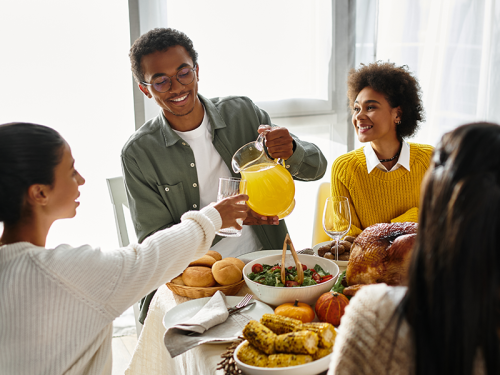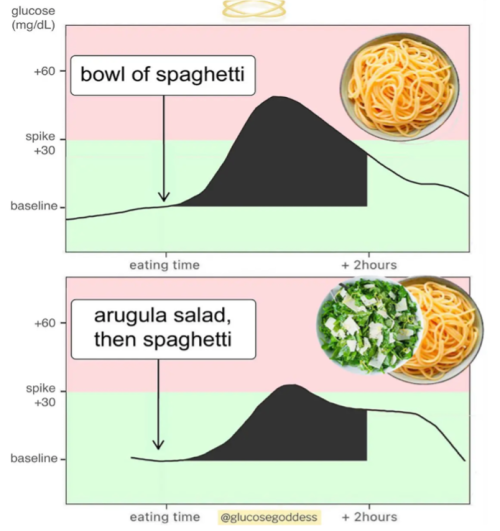
By Megan Lowey
Thanksgiving is a time for gratitude, celebration, and great tasty meals. However, enjoying the festivities doesn’t have to mean dealing with energy crashes or sugar spikes, which translate into storing fat that can lead to diseases in the long term. You can balance your blood sugar while savoring your favorite holiday dishes with a few simple strategies.
1. Start with the protein.
Believe it or not, the order in which you eat your food matters! According to research, glucose and insulin showed a tendency toward lower levels by consuming carbohydrates last (Ferguson, 2023). This means eating protein or vegetables first can help manage sugar absorption. Start your meal with the protein (turkey, chicken, meat, tofu) and leave the delicious stuffing or mashed potatoes last.
As seen in Figure 1, you can see how eating carbs first increases your glucose level significantly, leading to a 5x increase in your insulin level (which will lead to fat storage) compared to eating protein and vegetables first. Lowering your energy to enjoy your family time all night!
Figure 1.
2. Mindfully pair starches with fiber.
Thanksgiving is full of carb-heavy dishes, but you can still enjoy them without the crash. Pair starchy sides with fiber-rich vegetables like green beans or a salad (as seen in Figure 1 as well). Fiber slows digestion and helps prevent sugar spikes, keeping your energy stable throughout the day.
3. Walk it off.
A brisk walk after a meal is not just a tradition for some—it’s scientifically proven to help regulate blood sugar. Even a 2-minute walk aids digestion and increases muscle glucose uptake, reducing post-meal sugar spikes. See how walking affects blood glucose in Figure 2.
Figure 2.
4. Stay hydrated.
Sugary beverages can sneakily add to your sugar intake. Aim to drink a glass of water for every drink you have. Staying hydrated not only helps dilute sugar in your bloodstream but also curbs overconsumption by keeping you feeling full.
Lastly, don’t forget to enjoy your meals! Savor every flavor, cherish the company of loved ones, and take in the warmth of the holiday season. By practicing these mindful habits, you can strike a balance between indulgence and wellness, ensuring you feel your best throughout Thanksgiving and beyond. Here's to a joyful and healthful holiday!
References:
- Bellini A, Nicolò A, Bazzucchi I, Sacchetti M. The Effects of Postprandial Walking on the Glucose Response after Meals with Different Characteristics. Nutrients. 2022 Mar 4;14(5):1080. doi: 10.3390/nu14051080. PMID: 35268055; PMCID: PMC8912639.
- Ferguson BK, Wilson PB. Ordered Eating and Its Effects on Various Postprandial Health Markers: A Systematic Review. J Am Nutr Assoc. 2023 Nov-Dec;42(8):746-757. doi: 10.1080/27697061.2022.2161664. Epub 2022 Dec 27. PMID: 36574255.
- Images retrieved from Ichauspé, 2024. Retrieved on November 19, 2024.


